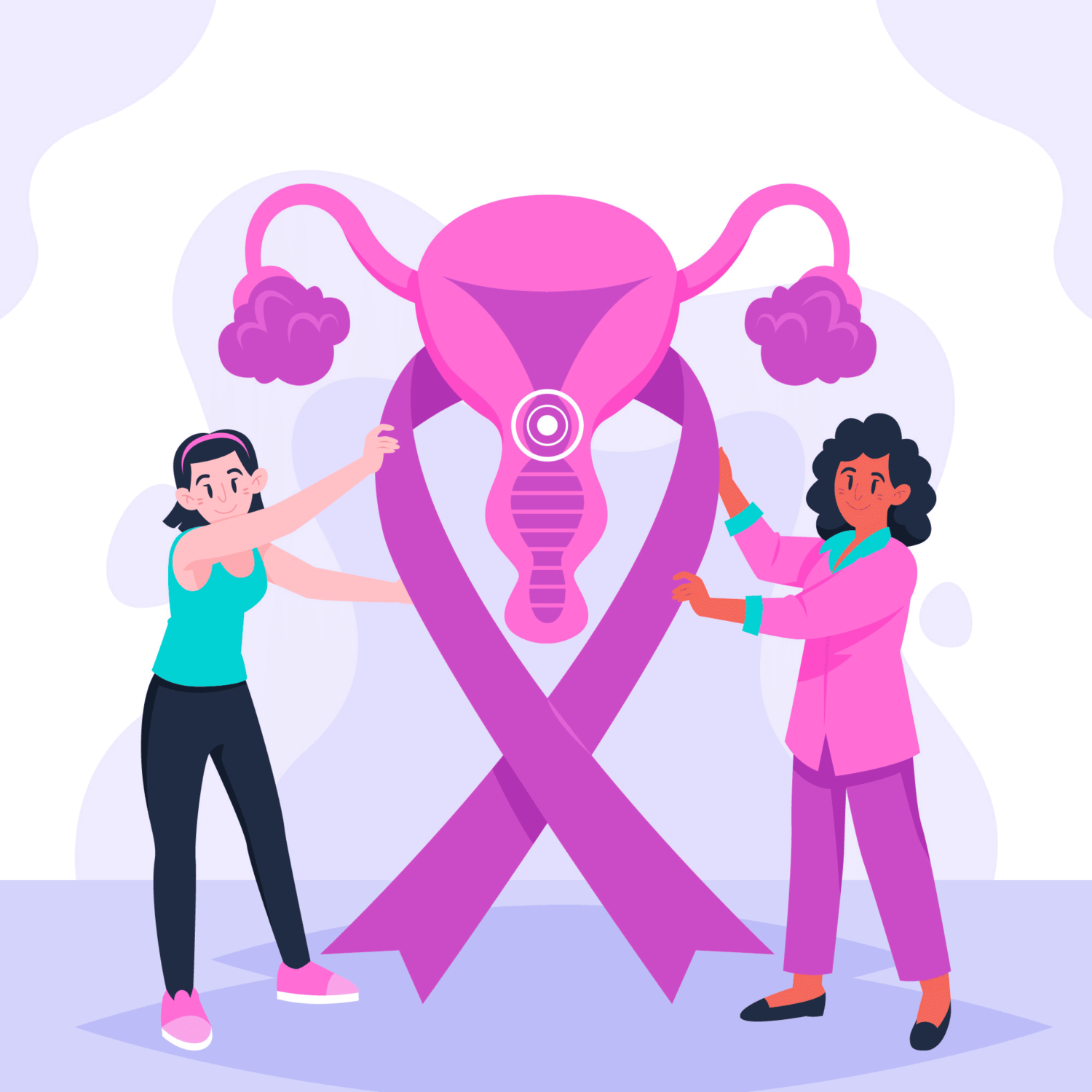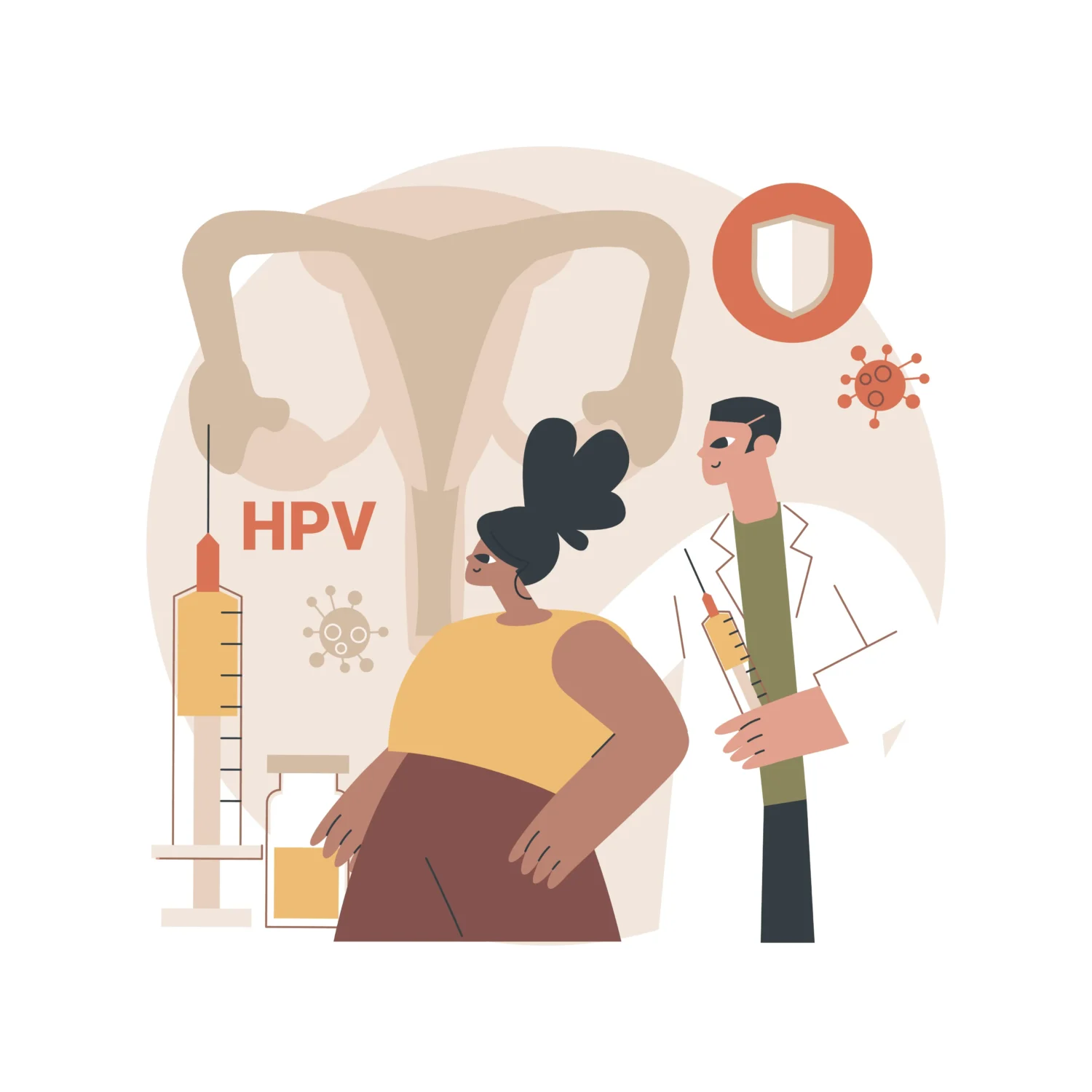
Cervical cancer is one of the cancers that affect the cervix. The cervix is the lower part of the uterus, which is connected to the vagina. This cancer is very common in women, but the good news is that it can be prevented and treated if caught early. In this article “Cervical Cancer & its Vaccine: All You Need to Know” we will talk about what cervical cancer is, how it is caused, and how you can protect yourself with the cervical cancer vaccine.
What Causes Cervical Cancer?
Cervical cancer is largely caused by a virus called human papillomavirus. HPV is very common and it spreads through skin-to-skin contact, especially during sexual activity. There are many kinds of HPV, but only a few can cause cervical cancer. Others may cause genital warts or may show no symptoms at all.
Often, the body’s immune system fights off the HPV. But in some cases, the virus lingers in the body for many years. It will then cause alterations in the cervical cells that can lead to cancer later.
Who Is at Risk?
Certain factors can increase the risk of cervical cancer, such as:
- HPV infection: This is the biggest risk factor.
- Smoking: Smoking weakens your immune system, making it harder for your body to fight HPV.
- Weakened Immune System: Conditions like HIV or medicines that lower immunity can increase risk.
- Early Sexual Activity or Multiple Sexual Partners: These factors increase the chances of being exposed to HPV.
- Not Getting Screened: Regular Pap smears or HPV tests help catch any changes in the cervix early.
Symptoms of Cervical Cancer
In the early stages, symptoms may not be very prominent. hence screening regularly becomes so important.
As the condition progresses, symptoms may include:
Early Symptoms
- Abnormal Vaginal Bleeding: This includes bleeding after sex, between periods, or after menopause. Even light spotting can sometimes be a warning sign.
- Unusual Vaginal Discharge: The discharge may be watery, have a strong odor, or contain traces of blood.
Advanced Symptoms
- Pain During Sexual Intercourse: This could indicate changes in cervical tissue that a doctor should check.
- Pelvic Pain: Persistent pain in the lower abdomen or pelvis that is not related to menstrual cramps.
- Back Pain: This can occur if the cancer has spread to nearby areas.
- Leg Swelling: In some advanced cases, the cancer may press against nearby lymph nodes or blood vessels, causing swelling in the legs.
If you notice any of these symptoms, seek professional help as early as possible. Early detection can save lives.
Preventing Cervical Cancer
The best way to prevent cervical cancer is to reduce the risk of HPV infection and detect any changes in the cervix early. Here’s how:
Get Vaccinated Against HPV
most types of HPV which are likely to cause cervical cancer, are preventable with the HPV vaccine The vaccine is safe and effective. It works best when given before someone becomes sexually active, typically between the ages of 9 and 14. However, it can also be given to older individuals up to the age of 45. Consult with your doctor to see if the vaccine is right for you.
Go for Regular Screenings
Pap smears and HPV tests are essential tools for detecting cervical changes early. Women should start getting screened at the age of 21 and continue based on their doctor’s advice.
Practice Safe Sex
Using condoms can reduce the risk of HPV infection, although it doesn’t provide complete protection because HPV can infect areas not covered by a condom.
Quit Smoking
Smoking weakens your immune system and makes it harder for your body to clear HPV.
Cervical Cancer & Its Vaccine: All You Need to Know
HPV vaccines are easy and effective means to provide immunity against the strains of human papillomavirus causing most cervical cancers. Three kinds of HPV vaccines exist, Gardasil, Gardasil 9, and Cervarix. These vaccines train your immune system to recognize the virus and fight it.
Who Should Get the Vaccine?

- Young people (ages 9 to 14): The vaccine works best when given at a young age, before exposure to HPV.
- Teenagers and young adults (ages 15 to 26): If they haven’t been vaccinated earlier, they can still benefit.
- Adults (ages 27 to 45): Some adults in this age group may benefit from the vaccine, especially if they are at risk for new HPV infections.
The vaccine is given in a series of two or three shots over several months, depending on the person’s age and health.
Is the Vaccine Safe?
Yes, the HPV vaccine is very safe. Millions of people around the world have received it, and serious side effects are extremely rare. The most common side effects include:
- Soreness or redness at the injection site.
- Fever.
- Headache or dizziness.
If you have concerns about the vaccine, talk to your doctor to get the facts.
Common Myths About the HPV Vaccine
Myth: The HPV vaccine is just for girls.
Fact: The vaccine is for everyone. Boys and men can also get HPV and spread it to others, so they should be vaccinated too.
Myth: The HPV vaccine encourages early sexual activity.
Fact: Studies have shown that getting vaccinated does not lead to early or increased sexual activity. The vaccine is about health, not actions.
Myth: I don’t need the vaccine if I’m not sexually active.
Fact: The vaccine works best when given before someone becomes sexually active, but it can still help later in life.
Why Is Awareness Important?
One of the most preventable cancers is cervical cancer. Vaccines, screenings, and healthy habits can help decrease the number of cases to a great extent. Still, lack of awareness remains one of the major barriers. Many people are not aware of HPV or the vaccine, and some cannot get screened or see a doctor. By spreading awareness, we can:
- Encourage more people to get vaccinated.
- Help women understand the importance of regular screenings.
- Break the stigma around discussing HPV and cervical health.
What Can You Do?
Talk to your doctor: Ask about the HPV vaccine and cervical cancer screenings.
Educate others: Share information with your family and friends to help them stay informed.
Advocate for better access: Support programs that provide free or low-cost vaccines and screenings.
Let’s Take Action Together
Cervical cancer never has to be a silent killer. With the right education and tools, we may protect ourselves and our dear ones. The HPV vaccine and regular screenings are just two of the most solid ways to prevent this dreaded disease. By taking action, we can eliminate cervical cancer and work on a future where cervical cancer is rare.
Remember: your health is in your hands, and prevention will always be better than the cure.
Join our community of informed readers! Subscribe to our newsletter for regular updates, health tips, and stories that matter to you.”



